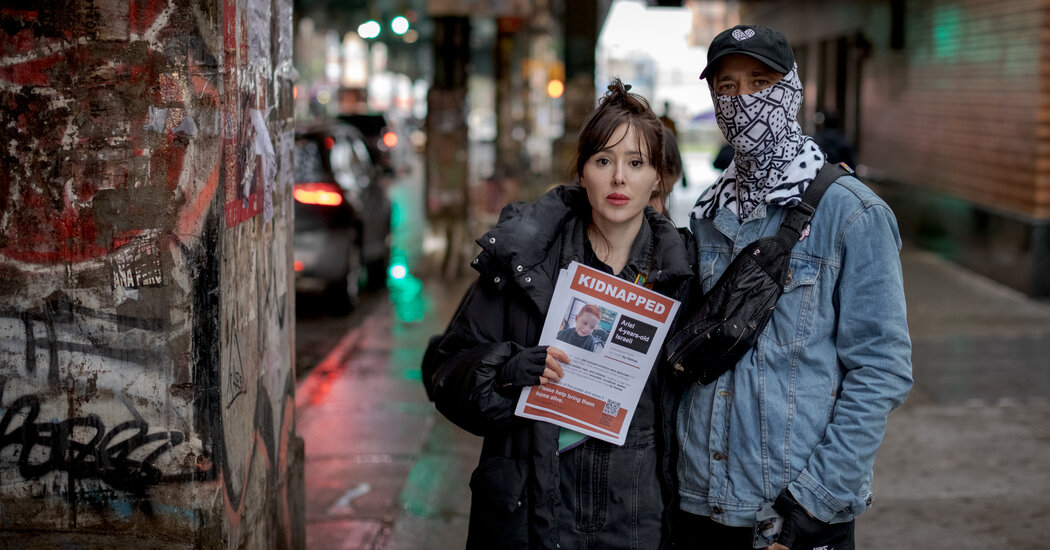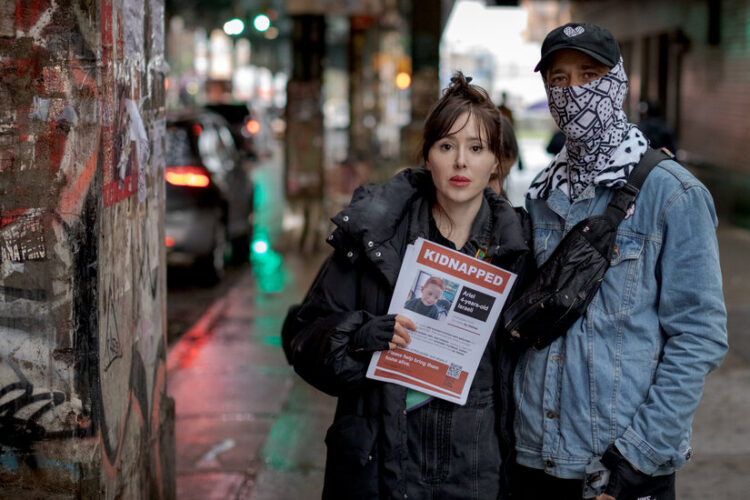
In New York and in cities around the world, stark posters with photos are bringing attention to those who were abducted by Hamas.
In the days since war broke out in Israel and Gaza, the streetscapes of cities such as New York and Berlin, Lisbon and Buenos Aires have been blanketed with emerging symbols of Israelis’ national pain.
They are paper fliers — posted on street lamps, tree trunks and parking signs, and in subway station stairwells — each bearing the word “kidnapped,” along with a photograph of someone abducted in Israel by Hamas terrorists.
The posters seem to appear out of nowhere and in some cases have disappeared just as quickly, torn down in a sign of the complicated anguish and anger produced by the Middle East conflict.
Part public street art and part viral activist campaign, the fliers were created by the Israeli artists Nitzan Mintz, 32, and her partner, who goes by the name Dede Bandaid, 36. There is no official public list of the kidnapped, so the artists have relied on direct outreach to the relatives and friends of those who were abducted for names and photos.
They were in New York City on a three-month visit from Israel when the war broke out. “We felt completely useless and miserable being so far away from our country,” said Ms. Mintz. “We could not bear it for one moment longer, and so we asked each other, ‘How can we use our talents as street artists to support the issue of bringing back home these poor people?’”
About a week ago, they (along with Tal Huber, a graphic designer in Israel) began creating these totems of the missing and sharing digital files of the images that can be downloaded and printed in 12 languages including Portuguese, Serbian and Dutch. Since then, in a grass-roots groundswell, people have printed the fliers and taped them in public spaces around the world. Gal Gadot, Amy Schumer and Jack Black among others have spread the messages on Instagram.
In New York, thousands of posters have been put up by the artists themselves.
The fliers show infants and children — Kfir, 9 months; and Emma and Yuli, pigtailed 3-year-old twins — as well teenagers and grandparents, like Liri Albag, 18, and Margalit Moses, 78. Most of the people who so far have been featured on the posters are Israeli. Some are also citizens of the United States, Argentina and Germany. All are shown in images taken before Oct. 7, when Hamas attacked Israel: They are feeding bottles to babies, smiling with spouses, posing for selfies in carefree repose beneath the stark “KIDNAPPED” banner.
The fliers are reminiscent of ones that were ubiquitous in New York in the days after the Sept. 11 attack, when loved ones hoped their missing relatives might be injured in hospitals or wandering the city.
Neither obituary nor eulogy, said Ms. Mintz, the signs should not be mistaken for memorials for the hostages. “There is still hope that they are alive,” she said.
In some cities, posters have been torn down soon after they were put up. The artists were not shocked. “We knew it would happen,” Ms. Mintz said. “We are street artists — our art doesn’t last long.”
She added, “Our goal is to put up 10,000 for each that is take away. We need to keep it alive.”
For Ms. Mintz and Dede, life has become a cycle of canvassing unfamiliar New York neighborhoods looking for print shops, yanking intractable packing tape off its roll and trying to do their part to help absorb the horror felt by their fellow Israelis after the Hamas kidnappings . (The fliers say that “nearly 200” people were abducted. News reports put the number at about 150.)
“Grandparents kidnapped!” said Ms. Mintz as she looked through a ream of just printed fliers. “I can’t believe I am even saying those words.”
Now, with hundreds of thousands of Palestinians rendered homeless as the Israeli government urged them to flee to the south of Gaza in advance of a likely ground invasion, the artists said they were praying for peace. “I am not happy about what is happening in Gaza, it is awful,” Ms. Mintz said. “I want the Palestinians to be free from Hamas, I want our children to learn together, I want Palestine to prosper and to be wealthy, but they need different leadership.”
She believes there must be change in Israel, too. “In the past two years, half of the population protested every single day against our government,” she said. “So we also have issues. First we need to replace Hamas immediately, but I believe we then need to replace our government too.”
On Saturday, Ms. Mintz and Dede spent half their day taping 600 fliers to whatever flat surface was dry enough for the tape to stick. They mostly avoid papering in the subway, but on this rainy day they followed the foot traffic and taped dozens of signs along the stairwells of the Myrtle-Wyckoff Avenues station in Brooklyn. Subway riders slowed to take a look.
Ms. Mintz even went into a subway bathroom and posted a flier showing baby Kfir.
They focused the rest of the day on outreach — reconnecting with Ms. Huber in Israel to work on new fliers and the resharing of hundreds of social media posts as they try to expand the circle of those who might take part in the effort. The three of them also were fielding messages from relatives of the kidnapping victims, asking that their loved ones be included in the campaign.
Tal Shani, 47, spent several agonizing days trying to think of something, anything, she could do to help her son Amit Shani, 16, who was kidnapped from their kibbutz.
“A friend asked me if I wanted a poster of Amit, and I said yes,” Ms. Shani said in a phone interview on Sunday. “This is the only thing I can do for him now, to make his face all over the place so anyone will know what has happened.”
Still, it’s painful for her to look at. “It’s very hard for me now to see his face, to look at his picture. He’s my baby! He’s big, but he’s my baby. To see his face and the word above is ‘kidnapped?’ What? It’s not real! But it is.”
It was last Sunday that the artists were first brainstorming ways they could serve their country from a distance of 5,700 miles. They zeroed in on those who were abducted, they said, because they believe that the war would de-escalate if the hostages were freed.
They considered printing “Missing” messages on sides of milk cartons but did not want to wait to order the necessary materials. They simplified their idea and connected with Ms. Huber, who created the digital design of the posters.
By early last week, Ms. Mintz and Dede had printed 2,000 fliers and bought a few hundred roles of tape and were lugging the supplies around Manhattan as they taped them to utility poles on street corners and in parks. They asked strangers to help, offering stacks of fliers and tape to anyone who might join their campaign. They found no takers, they said.
That’s when they decided to share links to the digital files on social media, and to translate them into other languages. “It was like tossing a match on a dry field,” Ms. Mintz said. Within three hours, they began to notice fliers all over New York that they had no hand in posting. Then the images spread on Instagram.
“The kidnapped have not been freed yet,” said Dede, “but it feels like we are doing something.”

